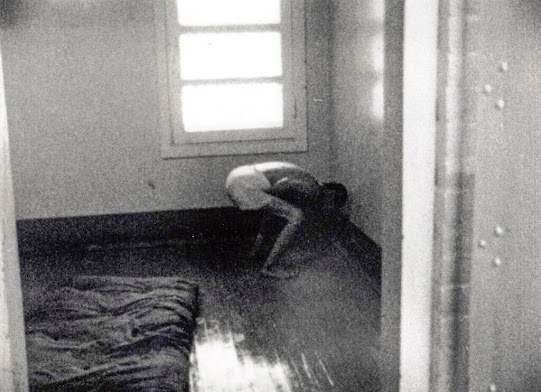Enjoy Poverty!
Enjoy Poverty by Renzo Martens confronts the viewer with the borderlines of ethics, but in a much different way than Breton's Eux et moi. Martens, a Dutch artist sets out to Congo to explore how different Western institutions and organizations (NGOs, media, the art scene) exploit and profit from the poverty of Congolese people. He is present in a different way than Breton was: he is much more of an artist than an anthropologist, even though he utilizes ethnographic methods to reveal the situation of his subjects and immerse himself in their lives. His goal is to create a very disturbing art piece (the neon-lit 'Enjoy Poverty' sign which serves as a satirical commentary on Western hunger for disaster porn), as well as to explore how Western organizations deal with the humanitarian crisis and suffering in Congo. However, his project evolves into a kind of workshop/emancipation initiative to teach Congolese photographers the necessary skills to capitalize on their own poverty, just as visitors from the Global North do. The bitter moral of the film is that even if local photographers use the same exploitative, sensationalist visual language as Western journalists they just cannot access the market and cannot 'sell' their own misery. Even though Martens claims that 'poverty is a resource' that Congolese people can turn to their advantage, poverty proves to be a resource only to the already powerful (just like developmental aids from Western countries actually flow back to the very same countries through NGOs and other Western-owned for-profit companies).
What makes Martens' film so unsettling is the way he establishes relationships with his collaborators and the self-reflexive way he criticizes the 'disaster porn' approach of Western humanitarian organizations, media and art. On one hand, he engages with his subjects with empathy and compassion (like the plantation worker and his family, or the Congolese photographers) but in other moments he seems unflinching and even cold (as he examines the ribs of the malnourished child to find the best angle for his Congolese protégés to take the best possible photos). He intends it to be the critique of the Western visual exploitation of African poverty, he reproduces its visual tropes. But what makes it disturbing is that it does not take the form of a parody or an ironic deconstruction but it becomes a pastiche or a replica. It complicates the situation that Congolese photographers imitate the predatory behavior of Western journalists because Martens teaches them that this approach would allow them to 'enter the market'. It is also striking to see how differently Martens presents the same topics. When he follows the plantation worker as he shows the sores on his malnourished child's body or when he makes a meal for the family, Martens' camera seems very compassionate and sensitive, but when he films the Western journalists take photos of the rotting corpses and documents the hospital in which malnourished children are taken care of he switches into a Wiseman-like observational mode, he makes the viewer stare at the most horrible and devastating sights.
Martens was also criticized for reproducing the very style he was speaking against. It can be argued that he arrived in Congo as an artist with a very specific agenda, to create an artwork that scandalizes people and creates an even more shocking effect than others. He is in a competition for capturing the short attention span of Western audience, just like the journalists who seek more and more shocking and violent content to gain more readers and profit for their news outlets. He basically documents an ambitious failure: his weird "emancipatory" project collapses when the Congolese photographers cannot obtain a press card that would allow them to enter to the most dangerous (and hence most visually intriguing) war zones (ironically, in their own country). It is an additional irony, when the coordinator of Médecins Sans Frontiéres and other Western journalists get scandalized by his aim to capitalize on poverty (it is also suggested that his press card should be revoked). In his own failed project Martens replicates the fruitless, temporary efforts of Western NGOs. They also launch short workshops with the intention of teaching poor people new skills and 'empowering' them (without initiating meaningful structural changes) and offer temporary release by giving out food supplies (Martens feeds the family of the plantation worker but it does not solve the famine of Congo). Just like Breton, Martens also confronts the viewer with the ability of the Western journalist/artist/anthropologist to abandon the field: they can engage in an effort to improve the lives of their struggling subjects but if they fail, they still have the opportunity to go back to their comfortable home countries. But they will still have the prestige of having tried and having produced a shocking document of poverty in the other side of the world.




Megjegyzések
Megjegyzés küldése